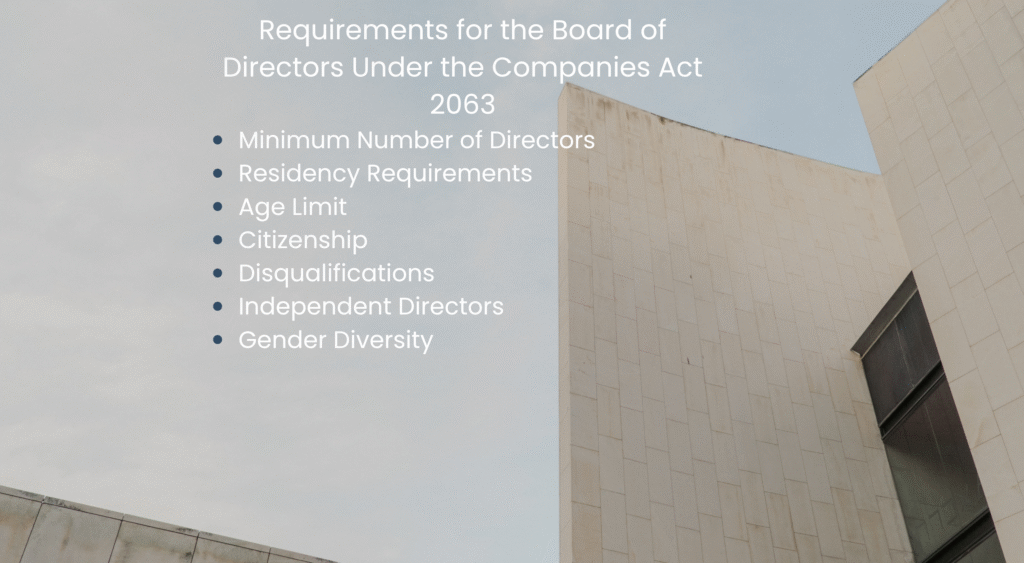The Board of Directors (BODs) of the company forms the central pillar of corporate governance in Nepali Businesses and Companies. BODs serve as the bridge between shareholders and management, whilst bearing ultimate responsibility for the company’s direction and oversight.
Understanding the legal framework, formation, requirements, powers, duties, and liabilities of directors is essential for anyone involved in corporate management or regulated in Nepal. To improve business practices, key regulatory bodies like Nepal Rastra Bank (NRB) and the Securities Board of Nepal (SEBON) have introduced several rules and guidelines.
These are aimed at uplifting how companies, particularly those listed on the stock exchange and financial institutions, manage themselves and operate transparently.
Legal Framework Governing Directors
The regulatory framework for directors in Nepal comprises several interconnected pieces of legislation that collectively establish the rights, duties, and responsibilities of those serving on company boards.
Here are certain laws which govern the BODs of the company in Nepal:
- Companies Act 2063, Chapter 6 has provisions relating to the BODs
- Companies Regulation 2064
- Securities Act 2063
- SEBON Corporate Governance Directives
Definition of Board of Directors Under the Companies Act 2063
Section 2(y) defines “Director” as any director of a company and includes any alternate director.
Section 2(z) has provisions relating to the “Board of Directors (BODs)” as the board of directors of a company.
Section 2(z1) defines the term “Managing Director” as a managing director of a company.
This broad definition encompasses all people serving in a director capacity, regardless of their specific title or designation.
Requirements for the Board of Directors Under the Companies Act 2063
The Companies Act, 2063 (2006) in Nepal lays out specific guidelines for the Board of Directors (BOD) to ensure that the board functions effectively and responsibly.
These requirements are designed to ensure that boards are diverse, competent, and represent shareholders’ interests while adhering to ethical business practices. Here is an overview of the key requirements:
Minimum Number of Directors
- Private Companies – Must have at least one director
- Public Companies – Are required to have at least three directors
This ensures that the company has proper governance and decision-making processes in place, especially for larger public companies.
Residency Requirement
- At least one director must be an ordinary resident of Nepal
This requirement helps ensure that the company is connected to Nepal’s legal and economic environment and that at least one board member is available to handle legal matters in the country.
Age Limit
- Directors must be at least 18 years old
This aligns with the general legal age requirements for individuals to enter into binding contracts, ensuring that directors have the legal capacity to manage the company’s affairs.
Citizenship
- There is no specific citizenship requirement for directors of Nepali companies
This means foreign nationals can serve as directors on the boards of Nepali companies, promoting diversity and allowing companies to benefit from global expertise.
Disqualifications
Certain individuals are disqualified from serving as directors. These include:
- Unsound mind – Individuals who have been declared legally incompetent
- Bankrupt individual – Those who have been declared bankrupt or insolvent
- Criminal Convictions – Directors who have been convicted of criminal offences related to moral turpitude are disqualified from holding the position
These disqualifications are in place to protect shareholders and ensure that directors have the integrity and legal standing to manage a company.
Independent Directors
An independent director is someone who has no material or financial relationship with the company other than their role as a director.
This is crucial to ensuring the board remains impartial and makes decisions in the best interests of shareholders, without undue influence from company insiders or major stakeholders.
Gender Diversity
While not legally required, there is a growing emphasis on gender diversity within boardrooms.
In some sectors, there is a push for female representation on the boards, recognising the value of diverse perspectives in decision-making.
Although not mandatory, many organisations are actively working to increase women’s participation in leadership roles, aiming for more balanced governance structures.

Appointment Of the BODs of the Company
In Nepal, the Companies Act, 2063 outlines key provisions about the Board of Directors (BOD), which is responsible for overseeing a company’s management.
These provisions are found in Chapter 6 of the Act, specifically in Sections 86 and 87. Here is a clearer explanation of these rules.
Appointment of Directors
- General Appointment Process – Directors are usually appointed at a company’s general meeting. However, for the first board of directors, the promoters (people who set up the company) will appoint the directors before the company’s first Annual General Meeting (AGM).
- First Appointment Limit – The first directors appointed hold their position only until the next AGM as per Section 90(2).
- Vacancies – If a director’s position becomes vacant, the Board of Directors can appoint someone to fill the vacancy. The new director will serve only the remaining term of the director they are replacing, under Section 90(2).
- Corporate Appointment – If a corporate body (another company) subscribes to shares of a company, it can appoint its own director. The number of directors appointed will be proportional to the number of shares it holds. The corporate body can also appoint an alternate director to attend board meetings in the place of the appointed director if the original director is unable to attend.
Number of Directors
- Private Company – A private company’s AOA (Articles of Association) will determine the number of directors, but it cannot exceed eleven directors.
- Public Company – A public company must have at least three directors, but no more than eleven.
- Female Representative – If there are female shareholders in a public company, at least one director must be a female shareholder, Section 86.
- Independent Directors – Public companies with fewer than seven directors must have at least one independent director. If there are more than seven directors, at least two independent directors are required. These independent directors should have experience or knowledge related to the company’s business, Section 86.
Chairperson of the Board
One of the directors is chosen as the Board’s chairperson. This person is selected by the directors themselves in accordance with Section 86(4).
Validity of Directors’ Actions
Under Section 106, if a director was appointed in violation of the proper appointment process (for example, if the appointment was not properly authorised), any actions the director took before the issue was discovered will remain valid.
However, the appointment must have been made in good faith, and the director’s actions will not be invalidated by a procedural mistake.
Qualification of the BODs of Companies
Not everyone can become a company director. Certain people are disqualified due to age, legal issues, or conflicts of interest.
The Companies Act, 2063, clearly defines these rules to ensure that directors are competent, trustworthy, and able to act in the company’s best interests.
Here is a certain ground for the incapability of the directors of the company:
General Situations of Disqualification
A person may be disqualified from being a director due to:
- Age – Being below the minimum required age
- Membership – Not being a member of the company as per the Articles of Association (AOA)
- Other grounds in the AOA – For example, being bankrupt, legally insane, or absent from the board meetings for six months
- Statutory disqualification – As specifically provided under the Companies Act
Specific Disqualifications
Section 89(1) lists thirteen grounds that disqualify a person from being a director:
- Age – Under 21 years for the public companies
- Unsound mind – Declared insane
- Bankruptcy – Declared insolvent, and five years have not passed
- Criminal conviction (moral turpitude/ corruption) – Less than three years since sentence, private companies or ongoing
- Conviction for theft, fraud, forgery, etc. – Less than three years since the sentence
- Conflict of Interest – Having a personal interest in a company contract or business
- Conflict with other companies – Already a director, substantial shareholder, employee, auditor, or advisor of another company (not applicable to private companies)
- Non-Payment of dues – Failed to pay any amounts due to the company
- Recent Punishment – Under Sections 160 & 161, less than the required lapse period
- Lack of specific qualifications – Required for companies carrying out specific businesses
- Non-compliance – Already director of a company that has failed to submit returns/reports for three consecutive years
- Unpaid fines – Has not paid penalties under Section 89(2)
- Remuneration conflicts – Receiving salaries/facilities from another listed company, except travel/daily allowances
Additional Disqualifications for Independent Directors
An independent director has stricter criteria under Section 89(2) of the Companies Act:
- Cannot fall under any of the general disqualifications listed above
- Cannot be a shareholder of the company
- Must hold at least a bachelor’s degree in a related field to the company’s business and have more than 10 years of relevant experience
- Cannot be an officer, auditor, or employee of the company or within three years after leaving such positions
- Cannot be a close relative of any officer in the company
- Cannot be the auditor or a partner of the company’s auditor
Removal of the Directors
A director may be removed from office under Section 89(3) of the Companies Act 2063. The Act specifies several situations where a person cannot continue as a director:
- Disqualification – If the director becomes disqualified based on the eligibility rules, as mentioned, such as age, criminal conviction, insolvency, or conflict of interest, they cannot continue in office.
- Resolution by the General Meeting – A director can be removed if the shareholders pass a resolution at the company’s general meeting.
- Resignation – If a director resigns and the Board of Directors accepts the resignation, they cease to hold office.
- Court Finding – A director must step down if a court finds that they:
- Acted with dishonesty or an ulterior motive in the company’s activities
- Did something prohibited by the Companies Act, or failed to do something required under the Act
- Denylisting – A director is also removed if denylisted by a competent authority, such as defaulting on a loan from a bank or financial institution, and the blocklisting period has not expired
Before declaring a director disqualified or removing them from office, the company must give the director a reasonable opportunity to defend themselves as per Section 89(4) of the Companies Act. This ensures fairness and due process, protecting directors from being unfairly removed.
Conclusion
The Board of Directors (BOD) is the cornerstone of corporate governance in Nepal, bridging the gap between shareholders and management while ensuring effective oversight of company operations.
The Companies Act, 2063, along with regulations from NRB and SEBON, provides a clear legal framework for the appointment, qualifications, powers, duties, and removal of directors.
These provisions ensure that directors are competent, trustworthy, and act in the best interests of the company and its stakeholders.





